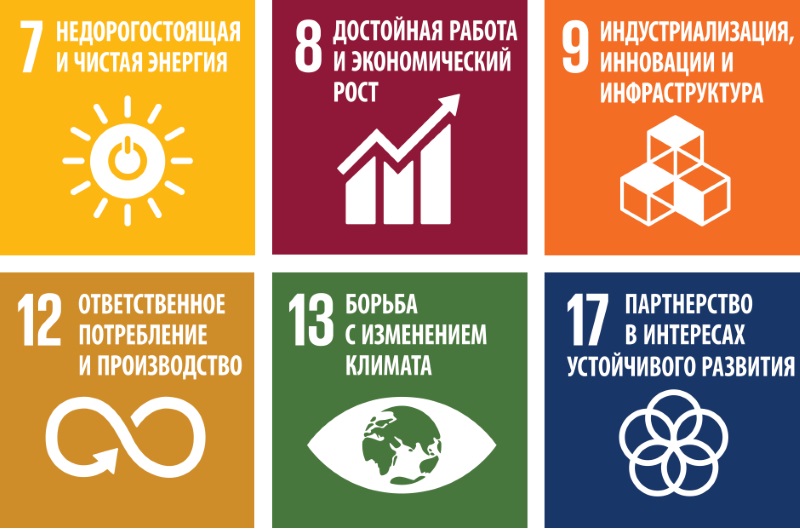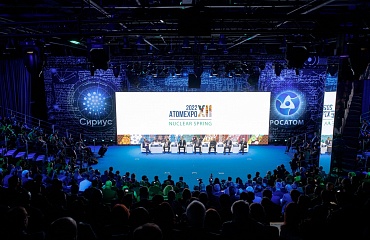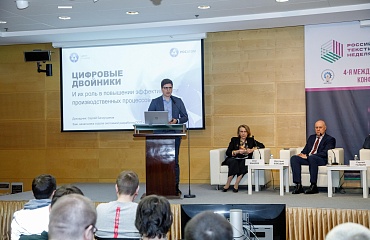22.06.2022
Nuclear infrastructure in Bangladesh as sustainable development factor

In 2021 the People’s Republic of Bangladesh celebrates the country’s 50th anniversary and 100th anniversary of Sheikh Mujibur Rahman, the first president and founding father of Bangladesh. The country is relatively young and represents the most dynamically developing South Asian state with a population of more than 165 million people as of the early 2021 with an annual economic growth of 7%. Despite the difficult economic situation caused by the coronavirus pandemic in 2020 and 2021, the country demonstrates a growing need for electricity, sustainable social and economic development, increased per capita income and decreased poverty.
The government of the country takes action to address challenges in the energy sector as evidenced by Mohammed Hossein, General Director of the Energy Reform Department of the Energy Department of the Ministry of Electricity, Energy and Natural Resources of the People’s Republic of Bangladesh: “We firmly believe we can meet our electricity demand using sustainable green technologies”. In 2020 the country’s leadership adopted a comprehensive development plan “Long-term plan of Bangladesh 2021-2041” aimed at combating poor ecology, limited natural resources and regular natural disasters, including those triggered by climate change. Efforts to reach Agenda 2030 complement Bangladesh ambition to become an upper middle-income country by 2031 and a developed country by 2041.
According to the Bangladesh Voluntary National Review (VNR) published in 2020, Rooppur NPP construction project is included in the list of projects for the development of the PRB energy sector and significantly contributes to Bangladesh priority sustainable development goals. For example, Rooppur NPP is aimed at providing 4% of total generated electricity by 2030, providing electricity to 100% of the population, fulfilling Goal 7 “Clean and Affordable Energy”. The country strives for implementation of other Sustainable Development Goals - Goal 12 “Responsible Consumption and Production”, Goal 13 “Climate Action”, Goal 9 “Industry, Innovation and Infrastructure”. Goal 8 “Decent Work and Economic Growth”: personnel from among local residents is equal to 7,000 people and the expected number of local specialists after the construction completion is 2,500 people engaged in the NPP project implementation in Bangladesh. Goal 4 “Quality Education” is being achieved as part of the development of human resources capacity and increasing the skills of nuclear specialists, which indicates responsible attitude of the country’s leadership in solving both global issues of global development and caring for the citizens, a human-centric approach.
The Agreement on Cooperation in Nuclear Power Plant Construction, the first nuclear power plant in the country constructed by Rosatom State Corporation, was signed in 2016 between the Government of the Russian Federation and the Government of the People’s Republic of Bangladesh (PRB). A unique integration system of intergovernmental agreements and additional protocols was applied for the first time, ensuring effective implementation of Bangladesh nuclear energy program in order to fulfill the requirements for nuclear safety, physical safety and the application of safeguards related to the use of nuclear materials, SNF and RW handling, development and planning of human resources capacity, service maintenance.
The decision to implement the Nuclear Energy Program (NEP) is based on a commitment to use nuclear energy safely and reliably for peaceful purposes. Recognizing the priority of safety in the use of nuclear energy, the PRB joined the IAEA in 1972. The Atomic Energy Commission (Bangladesh Atomic Energy Commission - BAEC) was established by the Order of the PRB President in February 1973. On June 18, 2010 the PRB Government approved the National Action Plan on Rooppur NPP Construction (BANPAP 2010) prepared by the BAEC with assistance of the IAEA. Under this NAP, the National Nuclear Power Committee (NNPC) was established to act as the NEP implementing organization and as a government organization for coordination and implementation of PRB NEP and the first NPP construction project at all stages of NPP construction and operation project development. BAERA, a competent independent body of the PRB, was established by Act No. 19 of 2012 to regulate activities in the field of atomic energy use. The upper-level structure of the NEP comprises the PRB Government, PRB Ministry of Science and Technologies, Bangladesh Atomic Energy Commission (BAEC), Bangladesh Atomic Energy Regulation Commission (BAERA) and 25 issue-specific ministries and authorities.
On October 14, 2019 the Cabinet of Ministers of the PRB approved the National Policy for the management of radioactive waste and spent nuclear fuel, under which the PRB adheres to the closed fuel cycle strategy based on a concept of sending SNF back to a nuclear fuel supplier country. On November 30, 2020 the PRB approved the PRB National Emergency Preparedness and Radiation Accident Public Protection Plan.
The Russian Federation as a responsible supplier of nuclear technology provides full assistance in building and enhancing of the partner’s national nuclear infrastructure. This obligation includes building of a steady national infrastructure ensuring the state, regulatory, regulating, administrative, process, personnel support and also support of the industry and stakeholders of the NEP throughout its entire lifetime for timely implementation of the project, risk identification and management, receiving approval on the project from all key stakeholders including the international expert community and IAEA experts.
In 2020, a comprehensive analysis of the national NI elements status was carried out by general contractor ASE EC JSC with engagement of industry NI integrator Rusatom Service JSC in cooperation with the industry expert community in order to determine infrastructure deficits, develop recommendations on the development of PRB NI for effective implementation of Rooppur NPP construction project in accordance with the IAEA recommendations. The analysis was conducted as part of an interdepartmental project, an Integrated Russian Support Plan was made in order to prepare for IAEA missions and coordinate the activities of key stakeholders both from the Russian side and the foreign partner’s side.
A.V. Ferapontov, Deputy Head of the Federal Environmental, Industrial and Nuclear Supervision Service commented: “There is a fruitful interaction with BAERA. According to the IAEA approach, our partners focus on the Russian regulatory framework with a subsequent strategic goal of issuing their own national standards. On BAERA’s request, IRRS IAEA mission is scheduled for the end of 2021 to enhance the efficiency of regulatory infrastructure in the field of nuclear and radiation safety. Three more IAEA missions are scheduled for 2022 to evaluate the PRB infrastructure in the field of atomic energy use in specific areas: for Quarter 1 - ISSAS, analysis of the state system for nuclear material control and accounting, for Quarter 2 -IPPAS, physical protection system assessment, for Quarter 3 of 2022 - EPREV, review of the emergency preparedness and response system at the national level. The analysis conducted in 2020 on assessment of management and regulation NI, taking into account the international methods and practices, identified areas for possible improvements, there were developed a Roadmap related to key events and Project licensing schedule, designed to synchronize the efforts of all stakeholders and involved departments of the RF and to prepare for IAEA missions”.
Julia Chernyakhovskaya, Deputy General Director for Nuclear Infrastructure of Rusatom Service JSC: “More than 60 NI experts from 21 industry organizations were involved in a comprehensive assessment of national PRB NI. A Roadmap for assistance in improving the PRB NI was developed for Rooppur NPP following the results of work with a planning time-frame of 10 years for 50 key PRB stakeholders in line with the Rooppur NPP construction project and licensing schedule”.
Development of human resources capacity to ensure efficient and safe implementation of the nuclear energy program is an integral part of building Bangladesh national nuclear infrastructure. Human resources are also significant elements of nuclear infrastructure.
On request of the Bangladesh, we are preparing a series of technical tours to the Russian Federation to transfer experience and exchange best practices in the areas of fire safety, emergency preparedness and response, external communications and cyber security”.
Vice-president - A.V. Deriy, Rooppur NPP Construction Project: “An important milestone for Rooppur NPP project – setting the power unit 1 reactor vessel to design position - is scheduled for September 2021. In addition, the reactor vessel and a set of 4 steam generators for power unit 2 were shipped from the manufacturing plant in April 2021. Despite the pandemic, it is important for us to startup the NPP on time and make every effort to obtain a license for its operation. The Rooppur NPP project is currently being implemented. All the key parties to the project, both from Russia and Bangladesh, need to work together”.
The government of the country takes action to address challenges in the energy sector as evidenced by Mohammed Hossein, General Director of the Energy Reform Department of the Energy Department of the Ministry of Electricity, Energy and Natural Resources of the People’s Republic of Bangladesh: “We firmly believe we can meet our electricity demand using sustainable green technologies”. In 2020 the country’s leadership adopted a comprehensive development plan “Long-term plan of Bangladesh 2021-2041” aimed at combating poor ecology, limited natural resources and regular natural disasters, including those triggered by climate change. Efforts to reach Agenda 2030 complement Bangladesh ambition to become an upper middle-income country by 2031 and a developed country by 2041.
According to the Bangladesh Voluntary National Review (VNR) published in 2020, Rooppur NPP construction project is included in the list of projects for the development of the PRB energy sector and significantly contributes to Bangladesh priority sustainable development goals. For example, Rooppur NPP is aimed at providing 4% of total generated electricity by 2030, providing electricity to 100% of the population, fulfilling Goal 7 “Clean and Affordable Energy”. The country strives for implementation of other Sustainable Development Goals - Goal 12 “Responsible Consumption and Production”, Goal 13 “Climate Action”, Goal 9 “Industry, Innovation and Infrastructure”. Goal 8 “Decent Work and Economic Growth”: personnel from among local residents is equal to 7,000 people and the expected number of local specialists after the construction completion is 2,500 people engaged in the NPP project implementation in Bangladesh. Goal 4 “Quality Education” is being achieved as part of the development of human resources capacity and increasing the skills of nuclear specialists, which indicates responsible attitude of the country’s leadership in solving both global issues of global development and caring for the citizens, a human-centric approach.
The Agreement on Cooperation in Nuclear Power Plant Construction, the first nuclear power plant in the country constructed by Rosatom State Corporation, was signed in 2016 between the Government of the Russian Federation and the Government of the People’s Republic of Bangladesh (PRB). A unique integration system of intergovernmental agreements and additional protocols was applied for the first time, ensuring effective implementation of Bangladesh nuclear energy program in order to fulfill the requirements for nuclear safety, physical safety and the application of safeguards related to the use of nuclear materials, SNF and RW handling, development and planning of human resources capacity, service maintenance.
The decision to implement the Nuclear Energy Program (NEP) is based on a commitment to use nuclear energy safely and reliably for peaceful purposes. Recognizing the priority of safety in the use of nuclear energy, the PRB joined the IAEA in 1972. The Atomic Energy Commission (Bangladesh Atomic Energy Commission - BAEC) was established by the Order of the PRB President in February 1973. On June 18, 2010 the PRB Government approved the National Action Plan on Rooppur NPP Construction (BANPAP 2010) prepared by the BAEC with assistance of the IAEA. Under this NAP, the National Nuclear Power Committee (NNPC) was established to act as the NEP implementing organization and as a government organization for coordination and implementation of PRB NEP and the first NPP construction project at all stages of NPP construction and operation project development. BAERA, a competent independent body of the PRB, was established by Act No. 19 of 2012 to regulate activities in the field of atomic energy use. The upper-level structure of the NEP comprises the PRB Government, PRB Ministry of Science and Technologies, Bangladesh Atomic Energy Commission (BAEC), Bangladesh Atomic Energy Regulation Commission (BAERA) and 25 issue-specific ministries and authorities.
On October 14, 2019 the Cabinet of Ministers of the PRB approved the National Policy for the management of radioactive waste and spent nuclear fuel, under which the PRB adheres to the closed fuel cycle strategy based on a concept of sending SNF back to a nuclear fuel supplier country. On November 30, 2020 the PRB approved the PRB National Emergency Preparedness and Radiation Accident Public Protection Plan.
The Russian Federation as a responsible supplier of nuclear technology provides full assistance in building and enhancing of the partner’s national nuclear infrastructure. This obligation includes building of a steady national infrastructure ensuring the state, regulatory, regulating, administrative, process, personnel support and also support of the industry and stakeholders of the NEP throughout its entire lifetime for timely implementation of the project, risk identification and management, receiving approval on the project from all key stakeholders including the international expert community and IAEA experts.
In 2020, a comprehensive analysis of the national NI elements status was carried out by general contractor ASE EC JSC with engagement of industry NI integrator Rusatom Service JSC in cooperation with the industry expert community in order to determine infrastructure deficits, develop recommendations on the development of PRB NI for effective implementation of Rooppur NPP construction project in accordance with the IAEA recommendations. The analysis was conducted as part of an interdepartmental project, an Integrated Russian Support Plan was made in order to prepare for IAEA missions and coordinate the activities of key stakeholders both from the Russian side and the foreign partner’s side.
A.V. Ferapontov, Deputy Head of the Federal Environmental, Industrial and Nuclear Supervision Service commented: “There is a fruitful interaction with BAERA. According to the IAEA approach, our partners focus on the Russian regulatory framework with a subsequent strategic goal of issuing their own national standards. On BAERA’s request, IRRS IAEA mission is scheduled for the end of 2021 to enhance the efficiency of regulatory infrastructure in the field of nuclear and radiation safety. Three more IAEA missions are scheduled for 2022 to evaluate the PRB infrastructure in the field of atomic energy use in specific areas: for Quarter 1 - ISSAS, analysis of the state system for nuclear material control and accounting, for Quarter 2 -IPPAS, physical protection system assessment, for Quarter 3 of 2022 - EPREV, review of the emergency preparedness and response system at the national level. The analysis conducted in 2020 on assessment of management and regulation NI, taking into account the international methods and practices, identified areas for possible improvements, there were developed a Roadmap related to key events and Project licensing schedule, designed to synchronize the efforts of all stakeholders and involved departments of the RF and to prepare for IAEA missions”.
Julia Chernyakhovskaya, Deputy General Director for Nuclear Infrastructure of Rusatom Service JSC: “More than 60 NI experts from 21 industry organizations were involved in a comprehensive assessment of national PRB NI. A Roadmap for assistance in improving the PRB NI was developed for Rooppur NPP following the results of work with a planning time-frame of 10 years for 50 key PRB stakeholders in line with the Rooppur NPP construction project and licensing schedule”.
Development of human resources capacity to ensure efficient and safe implementation of the nuclear energy program is an integral part of building Bangladesh national nuclear infrastructure. Human resources are also significant elements of nuclear infrastructure.
On request of the Bangladesh, we are preparing a series of technical tours to the Russian Federation to transfer experience and exchange best practices in the areas of fire safety, emergency preparedness and response, external communications and cyber security”.
Vice-president - A.V. Deriy, Rooppur NPP Construction Project: “An important milestone for Rooppur NPP project – setting the power unit 1 reactor vessel to design position - is scheduled for September 2021. In addition, the reactor vessel and a set of 4 steam generators for power unit 2 were shipped from the manufacturing plant in April 2021. Despite the pandemic, it is important for us to startup the NPP on time and make every effort to obtain a license for its operation. The Rooppur NPP project is currently being implemented. All the key parties to the project, both from Russia and Bangladesh, need to work together”.
Last news
.jpeg)

